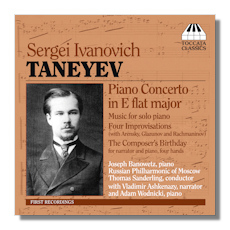
The Internet's Premier Classical Music Source
Related Links
- B. Tchaikovsky Reviews
- Latest Reviews
- More Reviews
-
By Composer
-
Collections
DVD & Blu-ray
Books
Concert Reviews
Articles/Interviews
Software
Audio
Search Amazon
Recommended Links
Site News
 CD Review
CD Review
Boris Tchaikovsky

Song-Cycles and Chamber Music
- Four Poems by Josef Brodsky
- Two Poems by Mikhail Lermontov
- Lyrics of Pushkin
- From Kipling
- String Trio
- Two Pieces
Olga Filonova, soprano
Svetlana Nikolayevna, mezzo soprano
Alexey Khutoriansky, violin
Lev Serov, viola
Marina Archakova, cello
Kirill Ershov, balalaika
Olga Solovieva, piano
First recordings. Recorded 2006; released 2009
Texts in Russian and English. Notes in English, German and French.
Toccata Classics TOCC0046 65:10
Stylistically and chronologically, Boris Tchaikovsky (1925-1996) might be said to be post-Shostakovich, whose influence he shows. He has been receiving recent international recognition in the form of recordings of his symphonies, concertos and other works. The present release brings us his song cycles of major Russian poets and an unfinished cycle of poems by Kipling, as well as an early string trio and a balalaika-piano duo. A particularly satisfying feature of this recording is the contrast and relief it offers in its arrangements for high and medium voices and purely instrumental works, which facilitates listening to the entire program without aural fatigue. More importantly, the performances are exciting. There is nothing dull here. What follows is in the order of the program.
Although the songs are sung in Russian the singing is so expressive that it is not really necessary to know anything of that language to experience their emotional thrust. The Brodsky cycle for soprano and piano (1965) begins bracingly with an impassioned poem about death with images of crows. The singing is edgy and the opening bars for piano are angular. The second poem is not too cheerful either, but the mood of the third, an upbeat farewell, is softer. The final song in this cycle is urgent but less so than the opening number. The piano accompaniment is varied, as is also the case in the other vocal pieces.
"From Kipling," for mezzo soprano and viola (1994-), offers a middle sonority which is as welcome as it is unusual. The two voices contrast in manner. In the first song, "Far-off Amazon," the viola skips along in a four note staccato phrase over the strkong and urgent voice of the singer. The other song, "Homer," opens with high string playing over fresh, melodic lyrical singing by the mezzo.
The trio for violin, viola and cello (1955) opens vigorously with a relatively short, but dense and complex movement – not as pleasant as it might be. The three instruments almost seem to go each their own way, but this likely just means that I have not listened closely enough. The three voices do stand out individually in the final Allegretto movement, which is called "Schubertian" by the commentator, and it is certainly melodic. The middle Andante movement is a gentle dialogue between the violin and viola before the cello enters. Aside from an intense middle section, its dominant mood is what I would call ruminative.
The short Lermontov poems for soprano and piano (1940), "Autumn" and "Pine Tree" are lyrical and lovely. The ending of the former is especially gentle. The two Balalaika and Piano pieces (1991) are also brief, especially the first, "Joke," which scampers on its way in less than a minute. "Landscape" is slow and gentle; the balalaika tinkles.
The most substantial piece, certainly in terms of length, at twenty-seven minutes, is the cycle of eight poems, "Lyrics of Pushkin" for soprano and piano (1972). I find this piece the most satisfying on the disc. The opening song, "Echo," takes a relaxed pace, with the piano permitting the singer to pause between phrases; the piano part is appealing. In contrast, the following number, "A Gift Unneeded," a despairing lyric, " is positively belted out by the soprano. The next two songs, "Talisman" and "To the Poet" were written in what sounds like the ideal range for Filonova's voice: in the second she is high, declamatory and especially clear. In "Your image" she soars engagingly with lyrical effect in legato phrases. "If you were deceived by life" begins with simple melodic piano phrases and continues with very expressive singing (possibly miked a tad close in this case). "Work" is solemn, deliberate and then impassioned. The final song, "I don't value highly ('From Pindemonti')" is an apolitical affirmation of beauty in nature and art, as well as an affirmation of the value of human emotion. At six minutes, the song is the longest on the program and I think the most beautiful. I even find it ravishing. On first hearing it I had to play it over again immediately.
Recommended highly for those who love vocal music.
Copyright © 2010, R. James Tobin





















